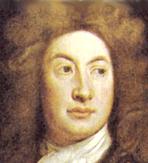









|
V. John Dryden (1631-1700)
1. Life:
 John Dryden, an English poet, critic and dramatist who would dominate
literary efforts of The Restoration, was born on August 19, 1631, in
Aldwinkle, Northamptonshire, England. Dryden was brought up in the strict
Puritan faith, and was sent first to the famous Westminster school, and then
to Cambridge. He made an excellent use of his opportunities and studied
eagerly. He had remarkable literary taste, but he showed little evidence of
his literary ability up to the age of thirty. In the political affairs, he
was quite changeable in attitude. Under the government of the Puritans, he
supported Cromwell, and wrote a poem upon Cromwell’s death. When the
Restoration period began, he turned to the
Royalists, and wrote a poem
celebrating the return of Charles II.
John Dryden, an English poet, critic and dramatist who would dominate
literary efforts of The Restoration, was born on August 19, 1631, in
Aldwinkle, Northamptonshire, England. Dryden was brought up in the strict
Puritan faith, and was sent first to the famous Westminster school, and then
to Cambridge. He made an excellent use of his opportunities and studied
eagerly. He had remarkable literary taste, but he showed little evidence of
his literary ability up to the age of thirty. In the political affairs, he
was quite changeable in attitude. Under the government of the Puritans, he
supported Cromwell, and wrote a poem upon Cromwell’s death. When the
Restoration period began, he turned to the
Royalists, and wrote a poem
celebrating the return of Charles II.
Dryden’s long poetic career spanned the four decades
from the Restoration in 1660 to the end of the seventeenth century. He wrote
in most of the literary forms that were popular during that time. To make a
living he wrote nearly thirty plays, and did a series of distinguished
translations of Virgil and other classical authors. His finest works were
his long poems in heroic couplets on political, religious, and literary
themes. Dryden’s best poetry was often inspired by some particular occasion
like the great fire of London in 1660. For almost twenty years Dryden was
England’s poet laureate, but he had t o resign in 1688 when James II was
expelled and Catholics were deprived of public office.
Dryden had superb gifts in verse satire. As he himself wrote,
the great art of the satirist is to do his job elegantly rather than
crudely. In poetry Dryden set an enduring style with his neat “heroic
couplets”. In prose Dryden established the neoclassical standards of order,
balance, and harmony; his greatest work of literary criticism is An Essay
of Dramatic Poesy, in which appears his famous appreciation of
Shakespeare.
Dryden’s importance in the Restoration period is greater than
that of any one. So the last quarter of the seventeenth century is, by
common consent, the “Age of Dryden”.
2. Dramatic Works
Dryden wrote about twenty-seven plays, including heroic plays
and comedies of manners. The well-known heroic play of Dryden’s is The
Conquest of Granada, which gained him great fame and popularity. This
play consist s of two parts with the historical background of the wars
between the Spaniards and the Moors. The great passions of the hero Almanzor
for the heroine Almahide, the external conflict between the major
characters, and the inner emotional conflict of the hero between love and
honor, are expressed in very highly poetic language. Almanzor is the
embodiment of freedom, who never complies with the bondage of any king or
law, but the sense of justice in his own heart. However, not everyone at his
age admired Dryden’s heroic plays, such as George Villiers, Duke of
Buckingham. In Villiers’ play, The Rehearsal, smeared Dryden as a
conceived poet who was excellent in heroic plays.
As for Dryden’s comedies, most of them took the
Spanish,
Sicilian and Italian royal courts as the background. The play
Marriage A-La-Mode, deals with the crown-seizing story in Sicily, and in
the meantime, two merry-seeking young couples are portrayed. Two husbands
love each other’s wives after one-year marriage and try every means to
realize the new combination. In Scene I Act I, the first lines establish the
tone of the whole play
Why should a foolish marriage vow,
Which long ago was made,
Oblige us to each other now
When passion is decay'd?
……
If I have pleasures for a friend,
And farther love in store,
What wrong has he whose joys did end,
And who could give no more?

|
![]()
![]()